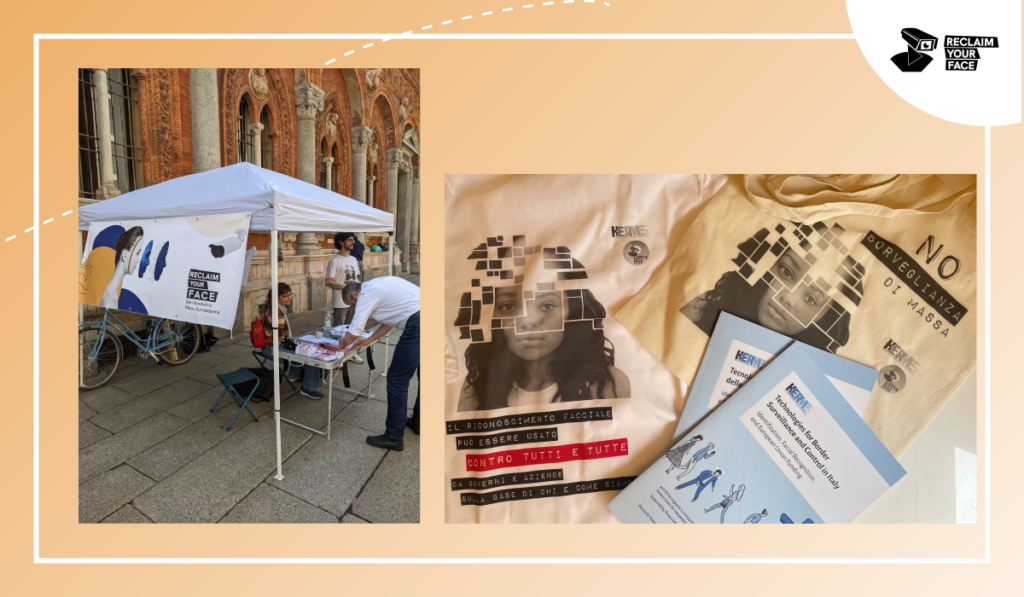During the second week of May 2022, Reclaim Your Face Italy held a week of actions for an EU ban on biometric mass surveillance in Milan, Torino and Como. They collected signatures on the streets of the 3 cities, joined an event organised by the Greens-European Free Alliance Group and made a field visit to Italy’s city, Como, the first one to implement facial recognition technology in a public park.
Background
In 2021, the Italian Data Protection Authority (DPA) rejected the police use of Automatic Image Recognition System (SARI). SARI is a real-time facial recognition system that was acquired by the Italian Police in 2017 and being under investigation by the Authority ever since. Albeit it is assured to never been used in real-time, this system was at the center of debate after it was revealed their intention to employ it to monitor arrivals of migrants and asylum seekers on the Italian coasts.
In its decision, the DPA argued that the system lacks a legal basis and, as designed, it would constitute a form of mass surveillance. Thanks to the actions of Hermes Center, Associazione Luca Coscioni, Certi Diritti, CILD, Eumans, info.nodes, The Good Lobby, Privacy Network, Progetto Winston Smith, and StraLi, a temporary ban on facial recognition technology in public spaces was introduced later. This moratorium will be in force until December 2023.
Now our Reclaim Your Face partners Hermes Center, Privacy Network, Certi Diritti, STRALI and CILD are fiercely campaigning to Ban Biometric Mass Surveillance in the EU.
Here are some of their latest actions!
Paper signature collection
On the 10th of May 2022, Reclaim Your Face hosted paper signature collection stands in three big cities of Italy: Milan, Torino, and Rome. This paper signature collection was organized by Hermes Center and two national Reclaim Your Face partners: StraLi and CILD. The activists were in front of Universities and in the city center to talk about the risks of biometric mass surveillance, giving out stickers, booklets, Reclaim Your Face T-shirts and bags.

Event with Greens-European Free Alliance Group
Colleagues from Hermes Center, Riccardo Coluccini and Davide Del Monte, joined as speakers for the event ‘Stop Biometric Surveillance – Time for an EU ban on biometric mass surveillance in public spaces’ to explain why Italy must carry on campaigning pushing for a real ban on biometric surveillance in the EU.
Visit in Como
Como was the first city to implement facial recognition technology in their park in 2019 through an offer by Huawei . The technology included also algorithms that detected different types of behaviours. Not coincidentally, in 2016 during the migration crisis, migrants were camping in this park waiting to cross the border.
After the work of activists and a journalistic investigation by Hermes Center colleagues Laura Carrer and Riccardo Coluccini, and researcher Philip Di Salvo, Como was obliged to shut down the system 2020.
In May 2022, together with representatives from the Greens- European Free Alliance Group and journalists from the Czech Republic, the researchers visited the park where Facial Recognition cameras were installed and talked about their investigation. While the cameras are still there, the Facial Recognition and other algorithmic functions are turned off at the moment. The Greens- European Free Alliance Group and Czech journalist later met with local journalist Andrea Quadroni who talked about the migrant crisis that hit Como in 2016.
The trip to Como is part of the Greens- European Free Alliance Group’s newly released mini-documentary while articles about the actions and results of Reclaim Your Face in Italy were published on national TV and radio station in the Czech Republic.


